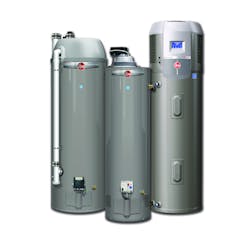Navigating the National Appliance Energy Conservation Act
The biggest regulatory change to impact the plumbing industry in recent years goes into effect next April, and there are still a number of questions and concerns about what it really means. The implementation of the new water heater efficiency standards as part of the National Appliance Energy Conservation Act (NAECA) presents major changes to the products known inside and out by contractors.
At Rheem we have been following the regulation closely for years and have had regular interactions with regulatory leaders, so that we can make sure our plumber and contractor customers are fully informed about what’s ahead.
Let’s break down what changes plumbers can expect next year. As of April 2015, the minimum efficiency levels of gas-fired and electric water heaters will increase. Gas-fired, residential, tank-type water heaters now have minimum Energy Factors (EFs) ranging from 0.48 for 100-gal. models to 0.59 for 40-gal. models. Next year, the minimum EFs go to 0.72 for 100-gal. models and 0.62 for 40-gal. models.
We’ll see similar changes for electric water heaters. Residential electric water heaters that are less than 55 gallons will have to meet new EFs around 0.94 or 0.95, increasing from today’s standards, which range from 0.90 to 0.94.
However, any residential, tank-type, electric water heater that is more than 55 gallons will have to meet EFs as high as 1.99. This is a big jump, considering that current EFs for these large-capacity electric water heaters range from 0.81 to 0.90.
Clearly, the products that will be most impacted by the new NAECA standards are large capacity residential water heaters. Rheem plans to maximize product designs by employing new technologies to meet the needs of the marketplace.
We anticipate that heat pump and high-efficiency condensing technologies, among others, will become increasingly relevant in the years ahead.
Many plumbers already have first-hand experience with heat pump and condensing technologies. Water heaters using heat pump technology have been in the market since 2009, and newer versions have come out since then.
Rheem also designed a water heater for residential applications that uses condensing technology. This model, the Rheem Prestige Series High-Efficiency Condensing Power Direct Vent Water Heater, is available in 38- and 48-gal. capacities and it has a 0.82 EF.
It’s also worth pointing out that condensing technologies have been used in tankless water heaters for the past four to five years, as well as in some commercial offerings.
Even though large-capacity water heaters are undergoing the biggest changes, every water heater sold in the United States will be affected by this regulation. Even if an EF is only required to increase slightly, there will modifications that must be made to get units to where they need to be.
For instance, a 40-gal. gas-fired, residential water heater presently must have a minimum EF of 0.59, but next year it goes up to 0.62. There are a number of considerations that must be made to make even this slight increase. Manufacturers are evaluating adding more insulation to units so that they’re able to retain more heat, and thereby operate more efficiently.
However, added insulation could lead to wider and/or taller water heaters, which then poses a concern about whether new models can fit in existing footprints. Rheem is working diligently to minimize any impact on water heaters’ sizes, since we recognize that contractors need units that can be easily dropped in for replacement installations.
Although there are still a number of unknowns ahead of us as the industry prepares for next year’s NAECA deadline, rest assured that Rheem is heavily investing to ensure that our products meet the new federal minimum efficiency standards. We’ve also started communicating with our distributors, contractors and homebuilder customers about the changes, and we’re determining what educational pieces and training sessions will be most beneficial to them.
However, as prepared as we are for the regulatory changes, manufacturers are waiting for the U.S. Department of Energy to release new test procedures for residential water heaters.
Test procedures impact how manufacturers validate products before they go to market. Since all manufacturers are working hard to develop products that meet the new NAECA standards, being faced with the possibility for new test procedures at the same time is complicated. We hope that the Department of Energy carefully considers the comments submitted by Rheem and other manufacturers and releases the Final Rule for the new Uniform Efficiency Descriptor and test procedure agreement as soon as possible.
Despite the uncertainty about potential new test procedures, contractors can feel confident in the fact that several products exist today that already meet the new NAECA standards. New products are also being introduced soon, and many of these products may feature the same — or similar — technologies available today.
Finally, as with any major regulatory change, it is imperative that manufacturers, distributors, contractors and industry trade association partners remain unified and committed to educating one another now and throughout next year.
